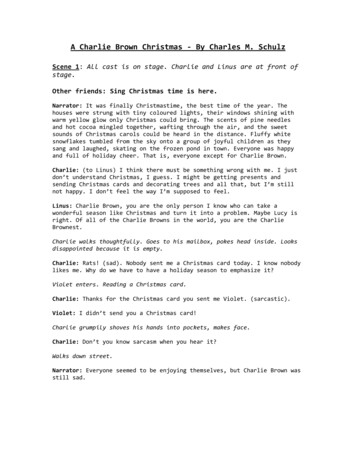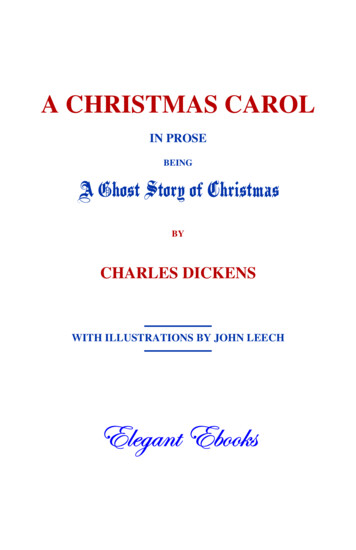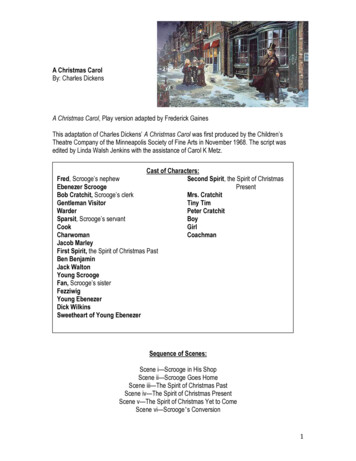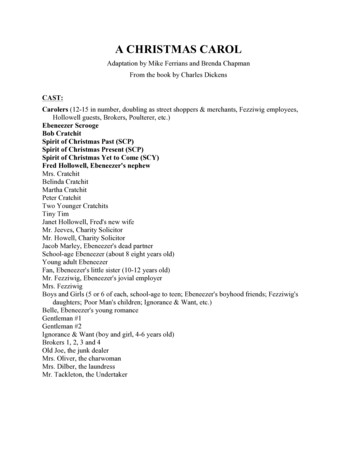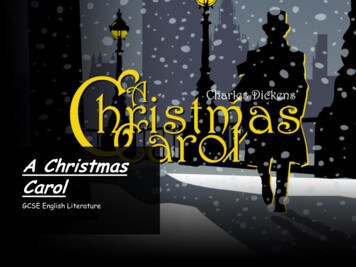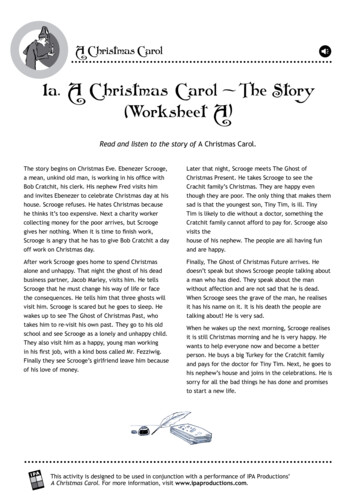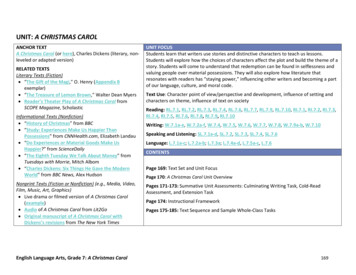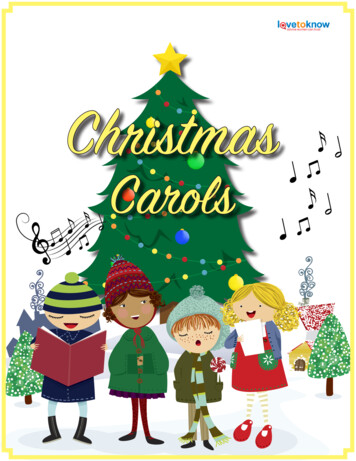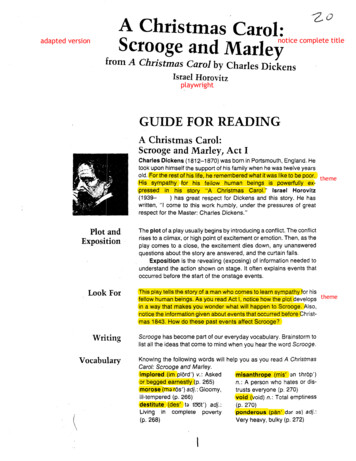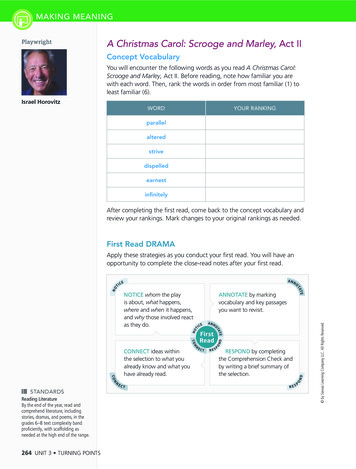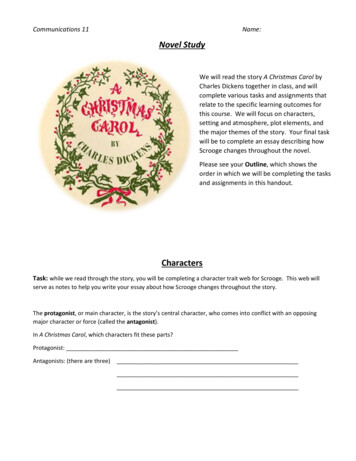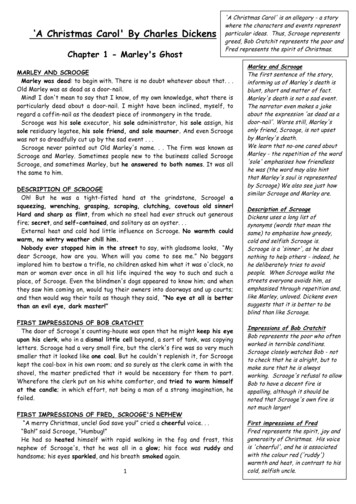
Transcription
‘A Christmas Carol' By Charles DickensChapter 1 - Marley's Ghost'A Christmas Carol' is an allegory - a storywhere the characters and events representparticular ideas. Thus, Scrooge representsgreed, Bob Cratchit represents the poor andFred represents the spirit of Christmas.MARLEY AND SCROOGEMarley was dead: to begin with. There is no doubt whatever about that. . .Old Marley was as dead as a door-nail.Mind! I don't mean to say that I know, of my own knowledge, what there isparticularly dead about a door-nail. I might have been inclined, myself, toregard a coffin-nail as the deadest piece of ironmongery in the trade.Scrooge was his sole executor, his sole administrator, his sole assign, hissole residuary legatee, his sole friend, and sole mourner. And even Scroogewas not so dreadfully cut up by the sad event . . .Scrooge never painted out Old Marley's name. . . The firm was known asScrooge and Marley. Sometimes people new to the business called ScroogeScrooge, and sometimes Marley, but he answered to both names. It was allthe same to him.DESCRIPTION OF SCROOGEOh! But he was a tight-fisted hand at the grindstone, Scrooge! asqueezing, wrenching, grasping, scraping, clutching, covetous old sinner!Hard and sharp as flint, from which no steel had ever struck out generousfire; secret, and self-contained, and solitary as an oyster. . .External heat and cold had little influence on Scrooge. No warmth couldwarm, no wintry weather chill him.Nobody ever stopped him in the street to say, with gladsome looks, “Mydear Scrooge, how are you. When will you come to see me.” No beggarsimplored him to bestow a trifle, no children asked him what it was o'clock, noman or woman ever once in all his life inquired the way to such and such aplace, of Scrooge. Even the blindmen's dogs appeared to know him; and whenthey saw him coming on, would tug their owners into doorways and up courts;and then would wag their tails as though they said, “No eye at all is betterthan an evil eye, dark master!”FIRST IMPRESSIONS OF BOB CRATCHITThe door of Scrooge's counting-house was open that he might keep his eyeupon his clerk, who in a dismal little cell beyond, a sort of tank, was copyingletters. Scrooge had a very small fire, but the clerk's fire was so very muchsmaller that it looked like one coal. But he couldn't replenish it, for Scroogekept the coal-box in his own room; and so surely as the clerk came in with theshovel, the master predicted that it would be necessary for them to part.Wherefore the clerk put on his white comforter, and tried to warm himselfat the candle; in which effort, not being a man of a strong imagination, hefailed.FIRST IMPRESSIONS OF FRED, SCROOGE'S NEPHEW“A merry Christmas, uncle! God save you!” cried a cheerful voice. . .“Bah!” said Scrooge, “Humbug!”He had so heated himself with rapid walking in the fog and frost, thisnephew of Scrooge's, that he was all in a glow; his face was ruddy andhandsome; his eyes sparkled, and his breath smoked again.1Marley and ScroogeThe first sentence of the story,informing us of Marley's death isblunt, short and matter of fact.Marley's death is not a sad event.The narrator even makes a jokeabout the expression 'as dead as adoor-nail'. Worse still, Marley'sonly friend, Scrooge, is not upsetby Marley's death.We learn that no-one cared aboutMarley - the repetition of the word'sole' emphasises how friendlesshe was (the word may also hintthat Marley's soul is representedby Scrooge) We also see just howsimilar Scrooge and Marley are.Description of ScroogeDickens uses a long list ofsynonyms (words that mean thesame) to emphasise how greedy,cold and selfish Scrooge is.Scrooge is a 'sinner', as he doesnothing to help others - indeed, hehe deliberately tries to avoidpeople. When Scrooge walks thestreets everyone avoids him, asemphasised through repetition and,like Marley, unloved. Dickens evensuggests that it is better to beblind than like Scrooge.Impressions of Bob CratchitBob represents the poor who oftenworked in terrible conditions.Scrooge closely watches Bob - notto check that he is alright, but tomake sure that he is alwaysworking. Scrooge's refusal to allowBob to have a decent fire isappalling, although it should benoted that Scrooge's own fire isnot much larger!First impressions of FredFred represents the spirit, joy andgenerosity of Christmas. His voiceis 'cheerful', and he is associatedwith the colour red ('ruddy')warmth and heat, in contrast to hiscold, selfish uncle.
"What's Christmas time to you but a time for paying bills without money?""I [Scrooge's nephew] have always thought of Christmas time . . . as a goodtime: a kind, forgiving, charitable, pleasant time: the only time I know of, inthe long calendar of the year, when men and women seem by one consent toopen their shut-up hearts freely, and to think of people below them as ifthey really were fellow-passengers to the grave, and not another race ofcreatures bound on other journeys. And therefore, uncle, though it hasnever put a scrap of gold or silver in my pocket, I believe that it has done megood, and will do me good; and I say, God bless it!"The clerk in the tank involuntarily applauded."Why did you get married?" said Scrooge."Because I fell in love.""Because you fell in love!" growled Scrooge, as if that were the only onething in the world more ridiculous than a merry Christmas. "Good afternoon!"His nephew left the room without an angry word, notwithstanding. Hestopped at the outer door to bestow the greeting of the season on the clerk,who, cold as he was, was warmer than Scrooge; for he returned themcordially.TWO GENTELEMEN ASK SCROOGE TO GIVE MONEY TO THE POOR"Are there no prisons?" asked Scrooge."And the Union workhouses?" demanded Scrooge."The Treadmill and the Poor Law are in full vigour, then?" said Scrooge. . ."I was afraid, from what you said at first, that something had occurred tostop them in their useful course,'' said Scrooge. "I'm very glad to hear it."On being asked for money, and told that the poor would rather diethan go to the workhouses. . . "If they would rather die,'' said Scrooge,"they had better do it, and decrease the surplus population. Besides . . . It'snot my business," Scrooge returned. "It's enough for a man to understandhis own business, and not to interfere with other people's. Mine occupies meconstantly. Good afternoon, gentlemen!"BOB AND SCROOGE"You'll want all day tomorrow, I suppose?" said Scrooge.The clerk observed that it was only once a year. . . and Scrooge walked outwith a growl. The office was closed in a twinkling, and the clerk, with the longends of his white comforter dangling below his waist (for he boasted nogreat-coat), went down a slide on Cornhill, at the end of a lane of boys,twenty times, in honour of its being Christmas Eve, and then ran home toCamden Town as hard as he could pelt, to play at blindman's buff.SCROOGE GOES HOMEScrooge took his melancholy dinner in his usual melancholy tavern; and,went home to bed. He lived in chambers which had once belonged to hisdeceased partner. They were a gloomy suite of rooms . . . nobody lived in itbut Scrooge, the other rooms being all let out as offices.After Scrooge sees Marley's face in the door knocker and a horsedrawn hearse drive up the stairs beside him. . . he closed his door, andlocked himself in; double-locked himself in, which was not his custom. Thussecured against surprise, he took off his cravat; put on his dressing-gownand slippers, and his night-cap; and sat down before the fire to take hisgruel.2Fred delivers the novella's mainmoral messages about theimportance of Christmas. Heexplains that Christmas is to bevalued because it is the one time ofyear when people see themselvesas equals, help each other andfocus on their spiritual lives ratherthan money: Christmas is good forthe soul! Scrooge only appreciatesmoney: he cannot understandmatters of the soul such asmarrying for love, rather thanwealth, or being cheerful justbecause it is Christmas. Scroogeseems to have no human feeling,warmth or love for his fellow man.We can see just how generous Fredis, because he doesn't becomeangry or frustrated with his uncle.Two gentlemen talk to ScroogeAs a child, Dickens had first-handexperience of poverty and workhouses. His early experiencesinfluenced his writing, and hisnovels are often concerned withdescribing the terrible conditionssuffered by the poor. Here,Scrooge's lack of pity for the pooris shocking and cruel. Scrooge'sargument that the poor are 'not mybusiness' show just how selfish andunchristian he is.Bob and Scrooge.We see further evidence ofScrooge's appalling meanness andlack of Christian feeling when hecomplains about Bob having a dayoff. Note that Bob doesn't have acoat, just a scarf (comforter) andyet, despite his poverty, stillmanages to be cheerful and playful.Scrooge goes homeEverything about Scrooge's life ismiserable - his money has notbrought him happiness. Rather thanenjoying dinner with his warmhearted nephew, Scrooge prefers adepressing meal in a pub. Also,Scrooge lives surrounded not bypeople, but by business, as theother rooms in his area are let outas offices.However, following some spookyevents, it seems Scrooge's life isabout to change - despite hisattempts to double-lock out theworld!
It was a very low fire indeed; nothing on such a bitter night. He was obligedto sit close to it, and brood over it, before he could extract the leastsensation of warmth from such a handful of fuel.Scrooge then sees Marley's face in the fireplace tiles, hears the bellsin the house ringing and a 'booming' clanking noise"It's humbug still!" said Scrooge. "I won't believe it."MARLEY'S GHOSTThe chain. . . was long, and wound about him like a tail; and it was made (forScrooge observed it closely) of cash-boxes, keys, padlocks, ledgers, deeds,and heavy purses wrought in steel. . .There was something very awful, too, in the spectre's being provided withan infernal atmosphere of its own. Scrooge could not feel it himself, but thiswas clearly the case; for though the Ghost sat perfectly motionless, its hair,and skirts, and tassels, were still agitated as by the hot vapour from anoven.When Scrooge refuses to believe in Marley. . . the spirit raised afrightful cry, and shook its chain with such a dismal and appalling noise, thatScrooge held on tight to his chair, to save himself from falling in a swoon.But how much greater was his horror, when the phantom taking off thebandage round its head, as if it were too warm to wear in-doors, its lowerjaw dropped down upon its breast!"It is required of every man," the Ghost returned, "that the spirit withinhim should walk abroad among his fellow-men, and travel far and wide; andif that spirit goes not forth in life, it is condemned to do so after death. Itis doomed to wander through the world -- oh, woe is me! -- and witness whatit cannot share, but might have shared on earth, and turned to happiness! . . .I wear the chain I forged in life . . . I made it link by link, and yard by yard; Igirded it on of my own free will, and of my own free will I wore it. . . Myspirit never walked beyond our counting-house -- mark me! -- in life myspirit never roved beyond the narrow limits of our money-changing hole; andweary journeys lie before me!""But you were always a good man of business, Jacob," faltered Scrooge,who now began to apply this to himself."Business!" cried the Ghost, wringing its hands again. "Mankind was mybusiness. The common welfare was my business; charity, mercy, forbearance,and benevolence, were, all, my business. . . At this time of the rolling year . . .I suffer most. Why did I walk through crowds of fellow-beings with myeyes turned down, and never raise them to that blessed Star which led theWise Men to a poor abode? Were there no poor homes to which its lightwould have conducted me!""You will be haunted," resumed the Ghost, "by Three Spirits.""I -- I think I'd rather not," said Scrooge.The air was filled with phantoms . . . Every one of them wore chains likeMarley's Ghost . . . Many had been personally known to Scrooge in their lives.He had been quite familiar with one old ghost, in a white waistcoat, with amonstrous iron safe attached to its ankle, who cried piteously at beingunable to assist a wretched woman with an infant, whom it saw below, upon adoor-step. The misery with them all was, clearly, that they sought tointerfere, for good, in human matters, and had lost the power for ever. . .Scrooge closed the window . . . He tried to say "Humbug!" but stopped atthe first syllable.3Despite a number of signs thatsupernatural forces are at work,Scrooge at this point refuses tobelieve the evidence of his owneyes and ears. Scrooge simplydismisses both Christmas and theghostly happenings as 'humbug'Marley's GhostMarley's ghost's appearance isvery shocking. The chain that hewears is compared to a tail, almostsnake-like (the devil was describedas a snake in the Bible) and ismade-up with symbols of money andgreed, such as the cash-boxes. Itis clear that Marley's greed hasresulted in him being sent to hellafter his death - the infernalatmosphere which surrounds theghost is the hot vapour from thefires of hell. Marley's horrificappearance reminds us of deathand is literally jaw-dropping!We discover that Marley's sin wasthat he did not pay enoughattention to his fellow man.Like Scrooge, he ignored otherpeople's suffering, he neverthought about anything other thanmoney. In life, Marley had failed tounderstand what is important - notmaterial wealth but spiritualwealth; he hadn't realised that'mankind was his business'.Like Scrooge, Marley was not agood Christian - he did notcelebrate Christmas because hedid not think about its meaning.Too late, Marley realises that heshould have shared his wealth, andvisited 'poor homes' just as the'Wise Men' did when they foundChrist in his 'poor abode'.Scrooge then sees many ghosts,whose suffering reveals whathappens when people fail to becaring. Dickens uses emotivelanguage, associated withsuffering, to remind the readerthat they too will end up in hell ifthey ignore the poor! Indeed, themisery of the ghosts seems evenworse than that of the poor.Scrooge is clearly affected bywhat he has seen: he is afraid ofbeing haunted by three spirits andwould rather not see them. He isalso no longer able to ignore whathe has seen and dismiss it as mere'humbug'.
Chapter 2 - The First of the Three SpiritsTHE GHOST OF CHRISTMAS PASTThe curtains of his bed were drawn aside, I tell you, by a hand. Not thecurtains at his feet, nor the curtains at his back, but those to which his facewas addressed. The curtains of his bed were drawn aside; and Scrooge,starting up into a half-recumbent attitude, found himself face to face withthe unearthly visitor who drew them: as close to it as I am now to you, and Iam standing in the spirit at your elbow.It was a strange figure -- like a child: yet not so like a child as like anold man . . . Its hair, which hung about its neck and down its back, was whiteas if with age; and yet the face had not a wrinkle in it, and the tenderestbloom was on the skin. The arms were very long and muscular; the hands thesame, as if its hold were of uncommon strength. Its legs and feet, mostdelicately formed, were, like those upper members, bare. It wore a tunic ofthe purest white and round its waist was bound a lustrous belt, the sheen ofwhich was beautiful. It held a branch of fresh green holly in its hand; and, insingular contradiction of that wintry emblem, had its dress trimmed withsummer flowers. But the strangest thing about it was, that from the crownof its head there sprung a bright clear jet of light, by which all this wasvisible; and which was doubtless the occasion of its using, in its dullermoments, a great extinguisher for a cap, which it now held under its arm. . . the figure itself fluctuated in its distinctness: being now a thing withone arm, now with one leg, now with twenty legs, now a pair of legs without ahead, now a head without a body: of which dissolving parts, no outline wouldbe visible in the dense gloom wherein they melted away. And in the verywonder of this, it would be itself again; distinct and clear as ever.Perhaps, Scrooge could not have told anybody why, if anybody could haveasked him; but he had a special desire to see the Spirit in his cap; andbegged him to be covered."What!" exclaimed the Ghost, "would you so soon put out, with worldlyhands, the light I give? Is it not enough that you are one of those whosepassions made this cap, and force me through whole trains of years to wearit low upon my brow!"It put out its strong hand as it spoke, and clasped him gently by the arm. . .The grasp, though gentle as a woman's hand, was not to be resisted.SCROOGE'S CHILDHOODThe city had entirely vanished. . . The darkness and the mist had vanishedwith it, for it was a clear, cold, winter day, with snow upon the ground. . .The Spirit gazed upon him mildly. . . "Your lip is trembling," said the Ghost."And what is that upon your cheek?"Scrooge muttered, with an unusual catching in his voice, that it was a pimple;They walked along the road . . .The jocund travellers came on; and as theycame, Scrooge knew and named them every one. . . Why was he filled withgladness when he heard them give each other Merry Christmas . . . What wasmerry Christmas to Scrooge? Out upon merry Christmas! What good had itever done to him?"The school is not quite deserted," said the Ghost. "A solitary child,neglected by his friends, is left there still.". . . a lonely boy was reading near a feeble fire; and Scrooge sat down upon aform, and wept to see his poor forgotten self as he used to be.4The Ghost of Christmas PastThe first ghost that visits Scroogemakes it impossible for him toignore its presence. Scrooge isliterally forced to look into itsface.The Ghost is describedsymbolically as it represents: youth, as seen its child-likeappearance and the summerflowers it wears, innocence as suggested by the'purest white' of its tunic (dress) the different ages of man as seenby its aged appearance and thefact that it moves though time knowledge as represented by thebright clear jet of light whichsprings from its head memories as seen by its shapewhich, like memories, at times isvague and changes and fluctuates.At first Scrooge is reluctant to bein the ghost's presence. When heasks that the Ghost cover its light,this suggests that Scrooge doesnot want his mind to be illuminated;that is, he does not want to learn.He also does not want to go withthe Ghost. However, the ghost hasan 'uncommon strength' and it isclear that Scrooge will not be ableto avoid going with it, or learningits lessons . . .The Ghost then takes Scrooge on atour through his childhood andearlier life, so that Scrooge is ableto see his former self, and see howhe changes.Scrooge's childhoodThere is a hint that Scrooge willnow be looking at himself clearly as'the darkness and mist hadvanished'. Scrooge is beginning tosoften - he is emotionally affectedby the trip back to his childhood asa tear appears on his cheek (hepretends it's a pimple). We alsosee a very different side toScrooge - as we realise that oncehe did appreciate Christmas.Scrooge's earlier comments toFred about the point of Christmasare repeated here suggest thatScrooge is beginning to realisewhat good Christmas can do.
Then, with a rapidity of transition very foreign to his usual character, hesaid, in pity for his former self, "Poor boy!" and cried again."I wish," Scrooge muttered, putting his hand in his pocket, and lookingabout him, after drying his eyes with his cuff . . . "There was a boy singing aChristmas Carol at my door last night. I should like to have given himsomething: that's all."SCROOGE'S SISTER, FANNY, AND FRED. . . a little girl, much younger than the boy, came darting in, and putting herarms about his neck, and often kissing him, addressed him as her "Dear,dear brother.""I have come to bring you home, dear brother!" said the child, clapping hertiny hands, and bending down to laugh. "To bring you home, home, home! . . .Father is so much kinder than he used to be, that home's like Heaven! . . .we're to be together all the Christmas long, and have the merriest time inall the world.""Always a delicate creature, whom a breath might have withered," said theGhost. "But she had a large heart! . . . She died a woman," said the Ghost,"and had, as I think, children.""One child," Scrooge returned."True," said the Ghost. "Your nephew!"Scrooge seemed uneasy in his mind; and answered briefly, "Yes."SCROOGE'S EARLY EMPLOYMENT: FEZZIWIG"Why, it's old Fezziwig! Bless his heart; it's Fezziwig alive again!"Old Fezziwig laid down his pen, and looked up at the clock, which pointed tothe hour of seven. He rubbed his hands; adjusted his capacious waistcoat;laughed all over himself, from his shows to his organ of benevolence; andcalled out in a comfortable, oily, rich, fat, jovial voice: . . . No more workto-night. Christmas Eve, Dick. Christmas, Ebenezer! Let's have the shuttersup,". . .People who came to the Fezziwigs' ball: a fiddler, Mrs. Fezziwig, one vastsubstantial smile, three Miss Fezziwigs, six young followers, all the youngmen and women employed in the business, the housemaid, with her cousin, thebaker, the cook, the milkman, the boy from over the way, the girl from nextdoor but one . . .There were more dances, and there were forfeits, and more dances, andthere was cake, and there was negus, and there was a great piece of ColdRoast, and there was a great piece of Cold Boiled, and there were mince-pies,and plenty of beer. . .When the clock struck eleven, this domestic ball broke up. Mr and MrsFezziwig took their stations, one on either side of the door, and shakinghands with every person individually as he or she went out, wished him orher a Merry Christmas.Scrooge, thinking about Fezziwig. . . Scrooge . . . speaking unconsciouslylike his former, not his latter, self. "He has the power to render us happy orunhappy; to make our service light or burdensome; a pleasure or a toil. . . .The happiness he gives, is quite as great as if it cost a fortune." . . . Hefelt the Spirit's glance, and stopped. . . . "I should like to be able to say aword or two to my clerk just now! That's all."5The ghosts help Scrooge to feelpity and compassion for people instages: first he feels sorry for thepeople closest to him, andeventually he comes to havewarmth and feeling for the wholeof mankind .Scrooge firstly feels 'pity for hisformer self.' This leads him to feelsorry for the 'boy singing aChristmas Carol at my door lastnight' as he reminds Scrooge ofhimself as a young boy.Scrooge's sisterThe second person Scrooge is madeto think about is Fred. Scrooge isreminded by the ghost that hissister, Fanny, was a very lovingyoung woman. Scrooge was veryfond of his sister and is probably'uneasy in his mind when he thinksabout Fred because he realisesthat he should have been a betteruncle to Fanny's son.Scrooge and FezziwigThe third person Scrooge is beingmade to think about is Bob, asScrooge compares himself toFezziwig as a boss.Fezziwig represents the spirit ofChristmas. He uses his wealth tospread joy and happiness. EvenFezziwig's appearance suggestsgenerosity, abundance, andfeasting. Fezziwig is very generous- his dance is open to everyone itseems wealth, and Dickens useslists to show how much food andentertainment was laid on. TheFezziwigs also make the effort toshow their appreciation to everyperson who attends their dance. Asa young man, Scrooge was obviouslyvery happy in his employment, andhis affection for his employer isshown in his delighted exclamation'Bless his heart'.As Scrooge remembers what it waslike to work for Fezziwig and theimportance of making people happy,he begins to think about what aterrible employer he has been toBob Cratchit by comparison.
SCROOGE AND BELLE, HIS FIANCEEHe was older now; a man in the prime of life. His face had not the harsh andrigid lines of later years; but it had begun to wear the signs of care andavarice. There was an eager, greedy, restless motion in the eye, whichshowed the passion that had taken root, and where the shadow of thegrowing tree would fall.He was not alone, but sat by the side of a fair young girl in a mourningdress: in whose eyes there were tears, which sparkled in the light that shoneout of the Ghost of Christmas Past."It matters little," she said, softly. "To you, very little. Another idol hasdisplaced me; and if it can cheer and comfort you in time to come, as I wouldhave tried to do, I have no just cause to grieve.""What Idol has displaced you?" he rejoined."A golden one. . . You fear the world too much . . . You are changed."She left him, and they parted."Spirit!" said Scrooge, "show me no more! Conduct me home. Why do youdelight to torture me?''"One shadow more!" exclaimed the Ghost."No more!" cried Scrooge. "No more. I don't wish to see it. Show me nomore!"The ghost shows Scrooge his former fiancee, now older, married andwith children . . . They were in another scene and place; a room, not verylarge or handsome, but full of comfort. Near to the winter fire sat abeautiful young girl, so like that last that Scrooge believed it was the same,until he saw her, now a comely matron, sitting opposite her daughter. Thenoise in this room was perfectly tumultuous, for there were more childrenthere, than Scrooge in his agitated state of mind could count . . . but no oneseemed to care . . when the master of the house, having his daughter leaningfondly on him, sat down with her and her mother at his own fireside; andwhen he thought that such another creature, quite as graceful and as fullof promise, might have called him father, and been a spring-time in thehaggard winter of his life, his sight grew very dim indeed.Chapter 3 - The Second of the Three SpiritsTHE GHOST OF CHRISTMAS PRESENTOn seeing light surround his bed . . . he began to think that the source andsecret of this ghostly light might be in the adjoining room, from whence, onfurther tracing it, it seemed to shine. This idea taking full possession of hismind, he got up softly and shuffled in his slippers to the door.It was his own room. There was no doubt about that. But it had undergonea surprising transformation. The walls and ceiling were so hung with livinggreen, that it looked a perfect grove; from every part of which, brightgleaming berries glistened. The crisp leaves of holly, mistletoe, and ivyreflected back the light, as if so many little mirrors had been scatteredthere; and such a mighty blaze went roaring up the chimney, as that dullpetrification of a hearth had never known in Scrooge's time . . . Heaped up onthe floor, to form a kind of throne, were turkeys, geese, game, poultry,brawn, great joints of meat, sucking-pigs, long wreaths of sausages, mincepies, plum-puddings, barrels of oysters, red-hot chesnuts, cherry-cheekedapples, juicy oranges, luscious pears, immense twelfth-cakes, and seething6Scrooge and Belle, his fianceeBelle is French for beautiful andthe young woman that Scrooge wasengaged to certainly was beautifulin mind and body.Here we see Scrooge a few yearsolder. Greed had begun to takehold of him, and he is no longer thecheerful, happy man he was. AsBelle notes, Scrooge has anotherIdol - 'a golden one' ie. money.Belle is referring to the gold calfof the Bible, which was worshippedas a false god. Scrooge has becomea sinner because he is no longer agood Christian who worships thetrue God. As Belle is poor, sherealises that Scrooge would rathernot marry her, so she breaks offtheir engagement. Scrooge doesnot fight to keep her - he wouldindeed rather remain single thanmarry a poor woman. We arereminded of his earlier words toFred 'Why did you marry?' and hislack of appreciation of love.When Scrooge sees Belle as anolder woman, surrounded by herfamily, he knows that he has madea terrible mistake. The family arenot wealthy but they arecomfortable and happy. Scroogebegins to weep, his sight growsdim, as he regrets the fact that hecould have had a beautifuldaughter to comfort him in his oldage.The Ghost of Christmas PresentScrooge is no longer reluctant tosee the ghosts - he wants to seethem and learn their lessons, as wesee when he leaves his bed to findthe second Ghost.The second ghost is associatedwith celebration, plenty and joy. Itis attractive, and surrounded byliving things - holly, ivy, etc feasts, abundance, light andwarmth. Dickens uses lists toemphasise how much food there isand the descriptions are mouthwatering and appealing. The Ghostsits in Scrooge's 'own room' toshow Scrooge what his home should- and could - be like! Also, like hisroom, Scrooge himself goesthrough a 'surprisingtransformation'.
bowls of punch, that made the chamber dim with their delicious steam. Ineasy state upon this couch, there sat a jolly Giant, glorious to see: who borea glowing torch, in shape not unlike Plenty's horn, and held it up, high up, toshed its light on Scrooge, as he came peeping round the door. . .the Spirit's eyes were clear and kind . . . It was clothed in one simplegreen robe, or mantle, bordered with white fur. This garment hung so looselyon the figure, that its capacious breast was bare, as if disdaining to bewarded or concealed by any artifice. Its feet, observable beneath the amplefolds of the garment, were also bare; and on its head it wore no othercovering than a holly wreath, set here and there with shining icicles. Its darkbrown curls were long and free: free as its genial face, its sparkling eye, itsopen hand, its cheery voice, its unconstrained demeanour, and its joyful air.Girded round its middle was an antique scabbard; but no sword was in it, andthe ancient sheath was eaten up with rust. . ."Spirit,'' said Scrooge submissively, conduct me where you will. I wentforth last night on compulsion, and I learnt a lesson which is working now. Tonight, if you have aught to teach me, let me profit by it.''The Spi
generosity of Christmas. His voice is 'cheerful', and he is associated with the colour red ('ruddy') warmth and heat, in contrast to his 'A Christmas Carol' is an allegory - a story where the characters and events represent particular ideas. Thus, Scrooge represents greed, Bob Cratchit represents the poor and Fred represents the spirit of .File Size: 222KB
